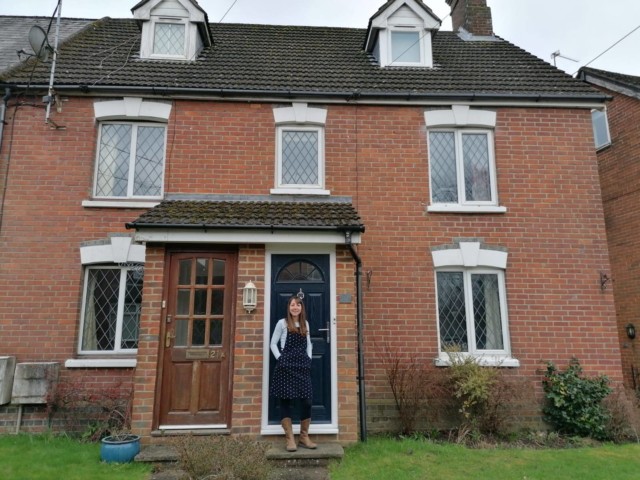RETIRED postman Eddie Curtis successfully won back £3,500 in council tax overpayments for his daughter and her elderly neighbour using a simple online form.
The 71-year-old from Kent convinced the Valuation Office Agency (VOA), who are responsible for setting the rateable value of a property, that both households had been paying the wrong amount for years.
Retired postie Eddie Curtis won
thousands of pounds back by filling out a simple online form
His daughter Eleanor Coughlin, 42, moved into her semi-detached home in Liphook, East Hampshire in 2010 with her husband Simon and their two young children.
She became friends with her neighbours and quickly realised something was odd about her council tax band.
“The neighbours who were in a bigger house told her they were in band C, which pays less council tax. She said ‘that is strange because we are in band D’.
At the time she had two young children, and she didn’t think much about it again until four years ago,” explained Eddie.
Eddie’s daughter and her family are now on the right council tax band, saving them £220 a year
When Eleanor had the time to pursue the issue again she contacted the VOA by phone.
“She contacted them four or five times only to be told each time that, in order to appeal against the banding, you need to show a comparable property which is near to you, that is in a lower band,” said Eddie.
But no comparable properties existed so Eleanor, now a mother-of-three, was unsure what to do next.
“The problem was that my daughter’s house was once one big house, which in 2000, was converted into two smaller houses, so there was not really another property that you could compare it with,” said Eddie.
 Eleanor Coughlin outside her home
Eleanor Coughlin outside her home
Undeterred, Eddie decided to take matters into his own hands in early 2018 and made a last ditch attempt to get the property revalued and rebanded.
“I said to my daughter ‘do you mind if I have a go? She said ‘I have tried and tried and not got anywhere but go ahead if you want to’.”
Eddie suspected when the original house was converted into two smaller houses in 2000, the new properties were not revalued for council tax purposes.
Preferring to put things in writing he decided to use the Resolver complaints website to challenge the council tax band.
“I based my appeal on that it seemed obvious to me that when the house was converted into two smaller houses it was never revalued.”
He said the process was simple and within eight weeks the VOA reduced his daughter’s council tax band from D to C, saving her £220 a year.
 The family got back almost £1,000 in overpayments too
The family got back almost £1,000 in overpayments too
They also reimbursed her for eight years’ worth of overpayments, which meant she received a lump sum of around £1,000.
But Eddie didn’t stop there. He realised his daughter’s elderly neighbour was in the same predicament and had probably been overpaying for years as well.
“I asked my daughter to speak to her immediate next door neighbour who lived in the smaller converted house, a lovely man who was 90 at the time and lived on his own. I was sure he was in the wrong band too,” said Eddie.
The neighbour was happy for Eddie to help and signed a form giving permission for him to talk to the agency on his behalf.
This time the response was even quicker. Within six weeks the neighbour received a letter from the VOA saying his band had been reduced to C from D. He also received 18 years’ worth of overpayments – around £2,500.
“He was over the moon. He couldn’t believe it. He gave me a £100 voucher to say thank you.”
Eddie urges other people to challenge their council tax band in writing if they suspect they are paying too much.
But he warned it can be a gamble.
 Eleanor Coughlin in her garden
Eleanor Coughlin in her garden
“One word of caution, is that, if you appeal and the VOA realise you are in the wrong lower band, they have the power to increase, not only your banding, but that of all your neighbours if they are found to be in the wrong band.”
A VOA spokesperson said they could not comment on individual cases but added: “We carefully consider various factors including a property’s size, character and location when determining the appropriate council tax band.
“Should a ratepayer believe they are in the wrong band there is specific evidence they must provide for us to be able to consider their case.
“More information on challenging your band can be found online.”
How to challenge your council tax band
Council tax bands are based on how much a property was worth on: 1 April 1991, for England and Scotland and 1 April 2003, for Wales.
You can challenge your band if you have been paying council tax on your property for less than six months.
If you’ve been paying council tax on your property for more than six months you can only challenge your band in specific circumstances.
These include if your property has changed for example, it’s been demolished, split into multiple properties or merged into one; your property’s use has changed for example, part of your property is now used for business; or your local area has changed for example, a new supermarket has been built.
The first step is to contact the Valuation Office Agency with supporting evidence to explain why you think your band is wrong.
The VOA may be able to review and change your band without you needing to formally challenge it.
If the VOA has reviewed your band and you do not agree with their decision, you can then formally challenge your band.
In England if you disagree with the decision of a formal challenge you can appeal to the Valuation Tribunal.
More information at: https://www.gov.uk/challenge-council-tax-band
We explain how to check how much your council tax bill is going up by from April 2021.
Households on a low income, Universal Credit or benefits can apply for a council tax bill reduction.
And because of the coronavirus crisis, you might be able to get an extra £150 knocked off your council tax bill.











